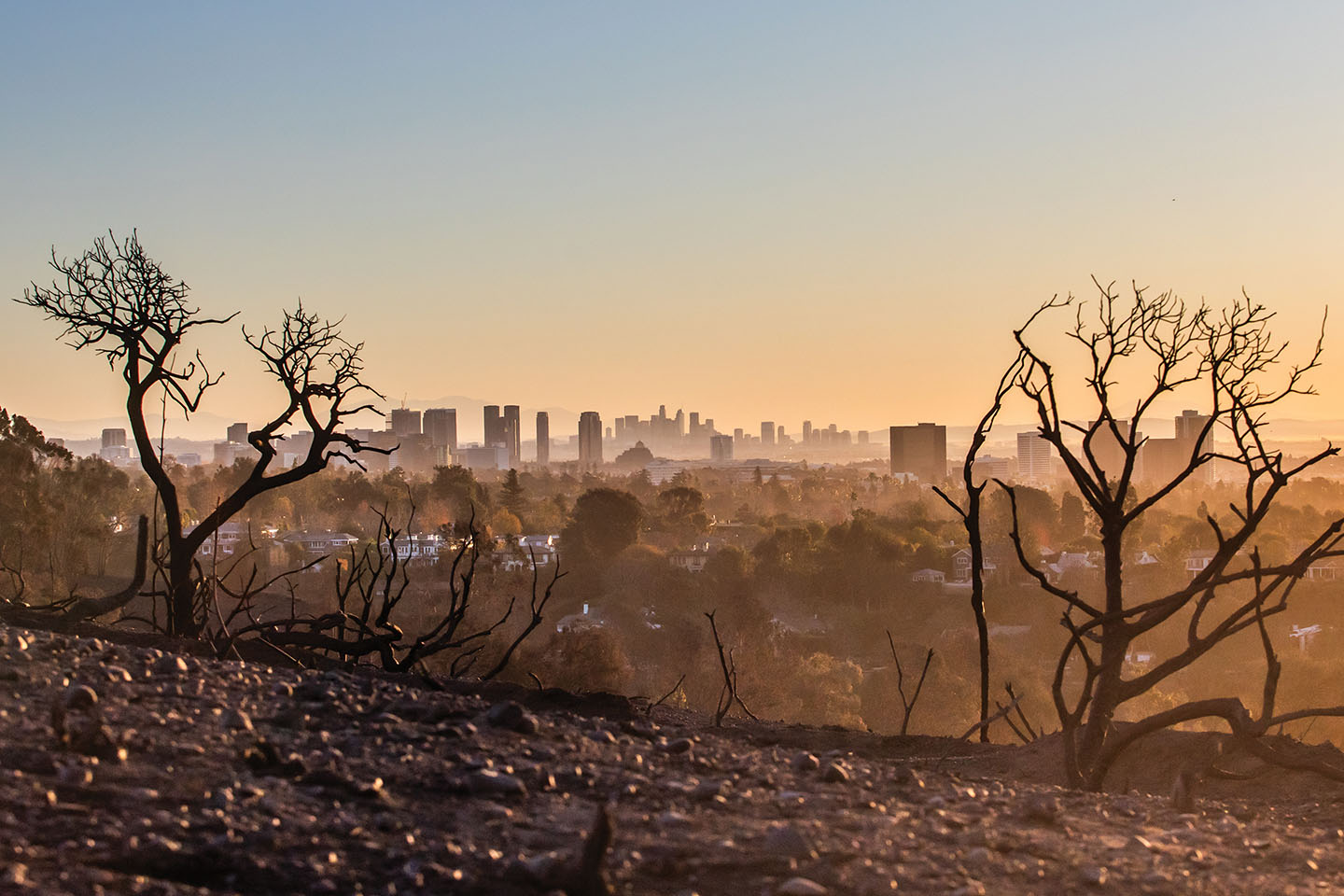On Passover, Jews around the world are obligated to fulfill the commandment of remembering the devastation and life-upending disruption that was woven into the exodus from Egypt as if it happened to them personally. It is not enough to recall a tragedy and be a passive observer of suffering. Rather, one of the most fundamental aspects of living a Jewish life is loving your neighbor as yourself and with this, mourning their losses as your own. As our city continues to burn, we must commit, as a community, to not only rebuilding the neighborhoods that were uprooted so violently, but to creating space for those who were previously shut out of those neighborhoods, to finally establish roots beside them. With firefighters still battling the two largest fires which have tragically taken many lives and destroyed over 12,300 structures, we begin to look past the ash at the daunting task of rebuilding our homes, schools, houses of worship and businesses.
As our city continues to burn, we must commit, as a community, to not only rebuilding the neighborhoods that were uprooted so violently, but to creating space for those who were previously shut out of those neighborhoods, to finally establish roots beside them.
However, no matter how uncertain the path forward may appear, the policy efforts to rebuild our communities decimated by the fires must not be defined according to the inherently broken systems of anachronistic zoning and layers of bureaucratic red tape that had previously rendered Los Angeles among the most unaffordable cities in the nation. Moreover, the road to recovery must be paved by policy that not only meets the moment of the acute needs of those displaced by the fires, but acknowledges, with deliberate policy reversal, the decades-old scars of segregation and exclusionary zoning that have prioritized chasm and poverty over community and brotherhood. It is indeed tragic that it took a horrific set of fires to force Los Angeles to come to terms with the long tail of some of her most egregious policy failures. Yet, if there is a silver lining at all at the end of this devastation it is that we have experienced how interconnected our lives really are and that we all have an integral part to play in the arc of our collective recovery and redemption.
Here are several policy recommendations to begin to address the failed policy that has marred the potential of our greatness for so long:
Upzone Los Angeles Immediately and Expedite Adaptive Reuse Projects
Housing insecurity is the direct result of exclusionary zoning which has led to a staggering 63% of Los Angeles residents being shut out of homeownership in the city. Moreover, wildfires have a direct correlation to the destruction of available housing stock, further reducing the supply of available homes in our city which, according to Creditnews Research, is the most rent-burdened in the entire nation. Rebuilding efforts, which must include the strict use of fire-resistant materials, will raise the cost of construction which will in turn be passed along as rent increased by approximately 12%.
Housing insecurity is the direct result of exclusionary zoning which has led to a staggering 63% of Los Angeles residents being shut out of homeownership in the city.
There are over 10,000 people who have lost their homes and who are now subject to the most unforgiving housing market in the country. Even before the fires, housing production citywide has been less than a third of what is needed to meet the goal for the construction of 250,000 more homes allowed through existing zoning rules. In short, the decision made by the Los Angeles City Council’s Planning and Land Use Management Committee to exclude 72% of the city’s residentially zoned land from upzoning must be vacated immediately and a post-World War II Marshall Plan level commitment to helping our community rebuild and recover must replace it. In simplest terms, even before the fires, Los Angeles could not afford to cater to the wishes of the privileged few demanding to preserve the “character of the neighborhood” by excluding the construction of additional housing. However, for far too long, local politicians have given in to this wealthy vocal minority at the expense of the greater good for the greatest number.
In 2024, the income needed to afford the median home in Los Angeles was $247,500. However, the median salary of Los Angeles was only $80,000. For many people who were fortunate enough to buy homes decades ago, most of their retirement savings lay in their home value — especially for those who come from less affluent areas that were hit by these devastating fires. For many of these people, the insurance payouts and FEMA support they will receive will fall vastly short of what will be needed to rebuild, and they will consequently be forced into permanent rentership due to a lack of resources to rebuild.
This will naturally hit hardest for communities of color and for the elderly. Politicians at the state-wide and local levels must recognize that single-family zoning, first enacted when the population was a mere fraction of what it is today, no longer represents the acute housing needs of the nearly four million residents of Los Angeles.
In addition, the necessity to convert vacant office space to livable residential space, especially in high-density areas with access to transit and green spaces, is integral to the creation of much needed housing. Downtown Los Angeles has witnessed much successful adaptive reuse. The outdated strip malls and massive parking lots that span so much of our city have grown obsolete with the advent of online shopping and ridesharing and consequently represent anachronistic waste of usable urban space. Rebuilding efforts must include conversion of these spaces to vibrant dense spaces with shared infrastructure such as schools, parks and playgrounds. Even before the fires, Newsweek reported that Los Angeles saw the largest outbound migration in the nation due to housing unaffordability. Now, we have an internal refugee crisis of displaced people who won’t be able to rebuild their lives around stable and affordable housing, absent a complete reversal of the deeply flawed decision to exempt the vast majority of the city from upzoning.
Suspend CEQA review and California Coastal Act
On Jan. 12, California Governor Gavin Newsom signed an executive order (EO N-4-25) to suspend permitting requirements under the California Environmental Quality Act (CEQA) and the California Coastal Act, with the goal of facilitating faster rebuilding of homes and businesses affected by the recent wildfires in Southern California. The goals of this executive order are to suspend CEQA review and California Coastal Act allowing for projects to repair, restore, demolish or replace properties or facilities substantially damaged or destroyed in recent Southern California wildfires.
In addition, this order seeks to direct state agencies to identify additional permitting requirements that may unduly impede efforts to rebuild and should be considered for suspension, including provisions of the Building Standards Code, Title 24 of the California Code of Regulation, direct the Department of Housing and Community Development to coordinate with local governments to identify and recommend procedures to establish rapid permitting and approval processes to expedite rebuilding and to collaborate with the state legislature to identify and propose statutory amendments to help expedite rebuilding while enhancing wildfire mitigation and response capacity within rebuilt areas.
However, the suspension of permitting requirements “applies only to properties and facilities that are in substantially the same location as, and do not exceed 110% of the footprint and height of, properties and facilities that were legally established and existed immediately before this emergency.” In its current form, it is unclear how significantly this order will impact rebuilding in practice. The waiver essentially mirrors an existing provision of the Coastal Act, which provides a permitting exemption for properties rebuilding after disasters provided the new buildings are sited in the same location and not more than 10% larger or taller than the destroyed structures. And CEQA, which requires public agencies to consider and mitigate the environmental impacts of proposed projects, already provides exemptions for single-family residences as well as the replacement or reconstruction of existing structures located on the same site and with “substantially the same” purpose and capacity as the prior structure.
A glaring omission in this executive order is that reconstruction projects must still comply with local zoning and permitting ordinances which can take months, if not years, to pass through the layers of bureaucratic red tape and various stages of approval. While well-intentioned in theory to mitigate the environmental impact of construction and density, in practice, CEQA has been a main contributor to the dearth of new housing that Los Angeles has seen since the 1970s. Even beyond the emergency executive order to address the acute needs of those displaced by the fires to rebuild in the fastest and most expedient way, CEQA must be revisited and significantly altered to address the acute housing shortage that it has created and to eliminate the lengthy process of environmental review.
Punish Price Gouging with Suspensions and Fines
Unfortunately, with any crisis come those who seek to exploit and profiteer from it, and these fires have brought out the worst of characters in both the buying and renting spaces. Moreover, despite being illegal, rampant price gouging continues to cater to the highest and most fortunate bidders exacerbating the chasm between the recoveries of those from more affluent vs less affluent communities. California Attorney General Rob Bonta (D) stated that law enforcement has been working to tackle “this unlawful and unscrupulous conduct” by creating predatory pricing investigations into fraud and blatant price gouging beyond the 10% increase in rent allowed by law. However, just as Los Angeles has failed to crack down on the use of illegal short-term rentals which further reduce scarce housing stock, these investigations will not be enough to curb profiteering from this devastation.
There needs to be a true disincentive to price gouging in the form of the loss of one’s right to list property in any open-source format within the state for a full year and in the case of a real estate agent engaging in price gouging, the loss of one’s license for an entire year with the record of the offence visible on their record. In addition, any realtor or landlord found guilty of price gouging must be fined per incident on a sliding scale. Meaning the more properties listed in violation of the law, the higher the fine. According to René Moya of the LA Tenants Union, “the fires unfortunately have greatly exacerbated our housing and homelessness crisis overnight. We lost so many housing units, people lost their homes.” There needs to be a collective zero tolerance policy for bad actors who use their access as agents or individual landlords who choose profiteering over community healing.
Ban Real Estate Speculators from Displacing Victims
As the aftermath of the tragic fires of 2023 in Lahaina, Maui have painfully shown, efforts to rebuild Los Angeles must remain extremely vigilant in thwarting the corporations and real estate speculators that prey on disaster areas, swooping in to buy valuable land for pennies on the dollar and displacing longtime residents in their most vulnerable hour. This is further exacerbated in the more traditionally working-class neighborhoods, such as Altadena, that were decimated by the Eaton fire. It is these neighborhoods, which are home to significant Black generational wealth unique to both the Los Angeles landscape and abysmal national statistics, that are most at risk for displacement of longtime residents. Specifically, during the Civil Rights era, Altadena became a very rare place of economic opportunity for Black Americans to achieve the markings of a middle-class life — namely access to homeownership — without the discriminatory lending practices that prevented so many Black families from transitioning from rentership to homeownership.
Many Black families of Altadena were subsequently able to keep homes within their families and thus pass down generational wealth resulting in a Black home ownership rate in Altadena of 81.5% which, according to the U.S. Census Bureau, is double the national average of 44%. This presents a unique opportunity, and arguably, an obligation, for the Los Angeles Jewish community to stand beside our Black neighbors and community members in solidarity to protect the wealth that they have been able to build despite the pernicious effects of segregation and discrimination in housing access.
According to California State Assemblymember Tina McKinnor (D-Inglewood), these neighborhoods will be targeted by unscrupulous speculative land investors “trying to take advantage of this natural disaster and its associated trauma for their own financial gain.” The state must adopt an iron-clad ban on corporate investors whose business model is to buy distressed land from displaced residents and convert this land into build-to-rent communities which will lead to immediate gentrification and lock out long-term residents from regaining ownership in their communities. One can make a strong argument that corporations should be banned from owning single-family residences nationwide even in “normal” circumstances as corporations outbid first-time homebuyers with all cash offers far above listing price forcing millions of aspiring homeowners into permanent rentership. However, it is particularly vital that corporations and real estate speculators be barred by means of state-wide executive order, from making offers on distressed land during this acute recovery stage.
For so many people across all demographic and socioeconomic sectors of the Los Angeles community, it is not the structure of the house, but the memories and stability of the idea of the home, that has been ripped away. However, the speed and ultimate success of our collective recovery must begin with acknowledging the failure of decades-old discriminatory housing policy. These fires have peeled back the layers of our collective vulnerability in ways that we could have never prepared for. The uncertainty ahead will challenge all of us to offer our unique talents and perspectives into the restoration effort.
For so many people across all demographic and socioeconomic sectors of the Los Angeles community, it is not the structure of the house, but the memories and stability of the idea of the home, that has been ripped away.
Yet, if we collectively commit – both morally and legally – to the immediate policy changes of expediting upzoning and adaptive reuse throughout the entire city with the utilization of the most sound fire-proof materials and engineering, the suspension of CEQA, a true moratorium on rent increases for an entire year that is both enforced legally and at the individual level, and an iron-clad refusal to sell off the land of displaced people to predatory corporations seeking to profiteer from our misfortune, we can begin to lay the foundations for a recovery for all Angelenos defined by our capacity for greatness that will prove to be far greater than the limits of our loss.
Lisa Ansell is the Associate Director of the USC Casden Institute and Lecturer of Hebrew Language at Hebrew Union College-Jewish Institute of Religion Los Angeles




